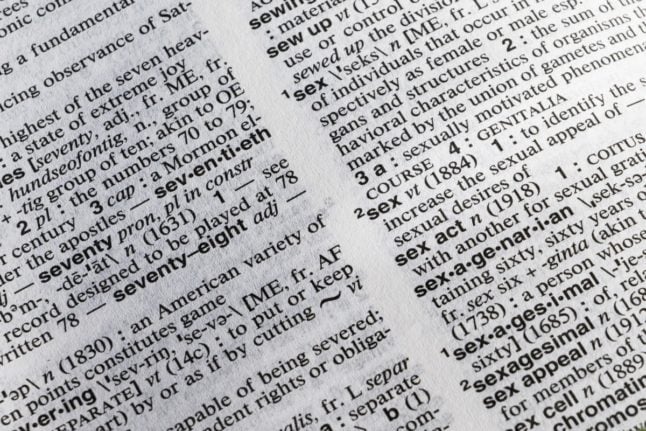Whether you are looking to apply for French citizenship or university, want to sign up for a language course or perhaps if you are simply interested in quantifying your existing language skills then you will need the A1-C2 language level indicators.
These are part of the Common European Framework of Reference for Languages (CERL) and mean that language levels can be assessed on an international level, without having to try and compare national qualifications such as SATs, A-levels and baccalaureates, which all use different qualifications.
Under the CERL scale, language learners are split into three broad levels – A meaning beginner, B meaning intermediate, and C meaning advanced.
If you’re looking to take exams at any of these levels, they will involve four sections; reading, writing, listening and speaking.
Here is how the government breaks them down:
A1 is a basic, introductory level where you should be able to “understand and use familiar, everyday expressions; respond with very basic statements to simple questions; know how to introduce yourself or someone else”.
At this level you ought to be able to ask or give directions to a place, and talk about time and weather.
The Local has put together a quiz based on past papers of A1 French exams – take the quiz here.
A2 is one step above A1, moving toward every day language capabilities.
At this point, you should be able to “understand single phrases and frequently used expressions that are used in everyday environments, such as when giving personal details or ordering food.
You should be able to communicate about simple, daily tasks that require only an exchange of direct information on familiar subjects.
B1 is the first intermediate level. At B1, you should be able to communicate well in daily situations, particularly when standard language is being used.
You should be “self-sufficient in most travel situations where French is spoken” and be able to engage in “simple and coherent discourse on familiar subjects and in areas of interest”. You should also be be able to “recount an event, experience or dream, describe a hope or goal, and briefly explain a project or idea”.
Some grammar subjects taught at the B1 level include past-perfect tense, the past and present conditional tenses, and speaking using hypotheses (si – or if). This is the level required for French citizenship.
The Local has put together a quiz based on past exam papers for the B1 exam – take the quiz here
B2 is the upper intermediate level. You should “be able to understand and read about both concrete and abstract topics; communicate spontaneously and easily with a native speaker; speak clearly and in detail on a wide range of topics, express an opinion on a relevant topic and discuss the pros and cons of a particular subject”.
While you may have learned some subjunctive in B1, you should have a wider understanding and ability to use it when at the B2 level.
C1 is the first advanced level. Many French language learners find it challenging to move from the B2 upper intermediate level to C1.
At the first advanced level, you should be able to comprehend long and demanding texts and capture implied meanings; speak spontaneously and fluently without struggling or having to look for words; use language effectively and flexibly in social, professional or academic life; express yourself on complex subjects in a clear and well-structured way that demonstrates control over syntax, strong articulation and cohesion of discourse.
C2 is the highest language level according to the CERL – it corresponds with having a master or near-native level in the language. You should therefore be able to understand virtually everything read or heard effortlessly, write at an advanced level with the ability to provide strong arguments, and express yourself orally in a spontaneous, very fluent, and accurate fashion while comprehending nuance and complex subjects (although having an accent is no impediment to achieving C2 level, as long as you can be clearly understood by a French person).
The key difference in the C2 level when compared with the C1 level is “proficiency in the language is illustrated by precision, appropriateness, and fluency of expression” according to Global-Exam.com.
What level do I need for French nationality and residency cards?
In order to apply for French naturalisation, you previously needed to prove that your French is at least at B1 level – via a certificate for the B1 level or above issued within the last two years in order to apply for citizenship through residency (unless you have studied at a Francophone university).
However, as a result of the newly passed immigration law, this standard will move up to B2 for citizenship. Similarly, some residency cards have new language requirements too – like the pluriannuelle multi-year card moving to A2 and the 10-year carte de résidence moving to B1.
Learn more here.
If you are interested in applying to French-language universities, you may see that the requirement is C1, as instruction only takes place in French. Some programmes might accept a B2 level as well.
The most common way to prove your language level is by taking an official exam that tests you using the CERL levels – many opt for the “DELF” test.
How can I improve my language level?
The Local spoke with Camille Chevalier-Karfis, from French Today to hear her tips on improving your French level.
Chevalier-Karfis’ top tip is to learn French with audio: “I am amazed to see that there are so many people who are still learning French only from books, and as such they do not have the pronunciation”.
She noted the trouble language learners have with liaisons in French. “For instance, the phrase Ils ont (They have) is roughly pronounced ‘ils zont’ with the liason between both words.
“Other phrases like Je suis allé (I went) and Je ne sais pas (I do not know) also have liaisons which make the pronunciation different from what one might expect when looking at the written version.
“When it comes to learning French, stick to level appropriate audio, if you are a beginner, find audio made for beginners. Learn everything with audio alongside. Don’t just use it for conversations”.
You can read more about Camille’s other top tips HERE.
READ MORE: A language expert’s top three tips for learning French



 Please whitelist us to continue reading.
Please whitelist us to continue reading.
Member comments